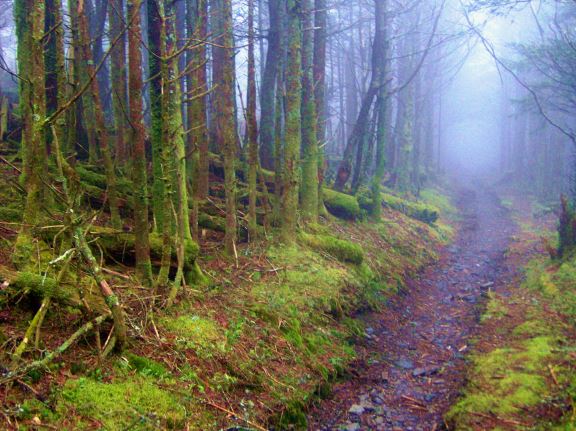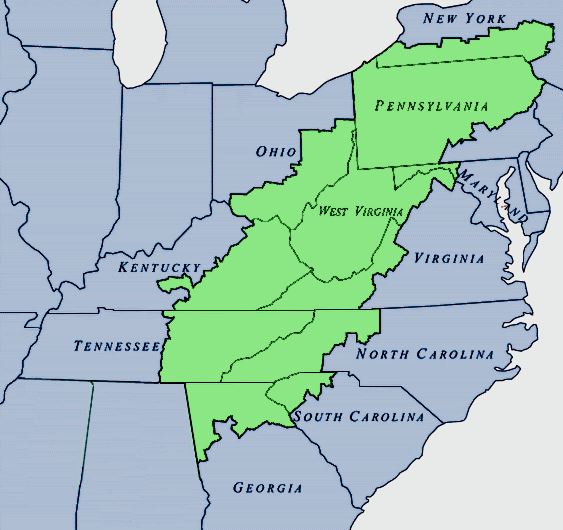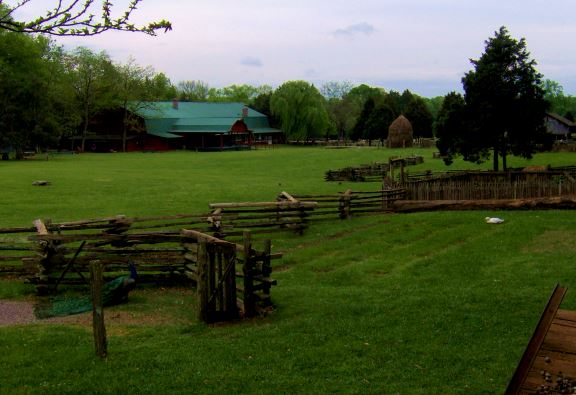Appalachia
by Gary Wright
Appalachia: rich land, rich people.

Old Black Appalachian Trail, Great Smokey Mountains, Tennessee
There is an exceptional place partially inside the boundaries of the South where people do not speak with a southern twang or drawl, neither is there a hint of a Yankee accent. When you step outside that area you are invariably barraged with “Where ‘bouts y’all from?” in the South or “Where youse guys from?” in the North. If they ask, “From whence do ye hail?” you are likely in Appalachia.
Wherefore are thou Appalachia and from whence cometh thou? Appalachia cuts a huge swath out of both the North and the South. Southern Appalachia includes Kentucky, Tennessee, Virginia, West Virginia, as well as parts of Alabama, Georgia and North and South Carolina. Appalachian accent is one that is entirely unique in the world. The language known as Appalachian-English is nearly pure Shakespearean English, which went dormant in England centuries ago. There are only two places in the world it is now spoken: in American Appalachia and in the theaters performing Shakespeare’s plays.

Appalachian Region of the United States
Appalachian-English originated in middle England and was at its height during the reign of Queen Elizabeth I, from whence cometh its name. It has come to be known as the language of William Shakespeare and is considered by many to be from the golden age of English-speaking.
Ancestry of Appalachia is traced back to 1603 when King James I became ruler of England, Ireland, and Scotland. He attempted to stamp out Catholicism and began populating the northern counties of Ireland, a Catholic stronghold, with Protestant Scots. The Ulster Irish refused to completely convert to the Church of England and English rule and thereafter remain essentially at war with England. When America was colonized, these Scots-Irish, staunch Protestants, began a great migration to freedom in the colonies. Being of a poorer class, most could only obtain lands deep in Indian territory, where the cheaper, more isolated lands were located.
No one else wanted these sparse, uninviting mountains, however, the Scots-Irish were hardy, independent, and creative. Already wary of strangers, government and close neighbors, they flourished in these new wilds and soon became one with them.
They readily adapted and gleefully adopted it as their home. Having been victimized by English overseers for generations, they disliked all authority and all government. Owing allegiance only to clans and families, these people took to the mountains and ‘hollers,’ depending on each other and avoiding contact with outsiders, they retained their native customs, culture, and language. They particularly dislike governments at all levels and disdain meddling strangers.
Deeply religious, they developed unique beliefs about music, religion, and language. Superstition still exists side by side with a mostly Presbyterian religion. They see little conflict in believing in Jesus’ miraculous birth and serving God, while carrying out hundreds of superstitions to keep the Devil away, to ensure productive crops and a myriad of other rituals.
Music is a large part of their culture, with piano and guitar providing the heart of the rhythm. Though, for unexplained reasons, the use of their beloved bagpipe died out, and its whiny, twangy sounds were replaced by the banjo, fiddle, and mandolin. Irish country dances have morphed into square dances and clogging, while highland reels became flings, bluegrass, and a hundred variations of modern country music.

Appalachian Museum
Like nearly all things related to Appalachia, there is no one clear answer to many questions, such as why so many pronounce words such as “wire,” “fire,” “tire,” and “retired” as “war,” “far,” “tar,” and “retard” respectively. Appalachian-English also places an “-er” sound at the end of a word with a long “o.” For example, “hollow”— a small, sheltered valley— is pronounced like “holler.”
Other examples are “potato” (pronounced “tader”), “tomato” (pronounced “mader”), and “tobacco” (pronounced “backer” or “backy.”) They also invented “H retention” at the beginning of certain words as well. “It,” in particular, is pronounced “hit” and “ain’t” is pronounced “hain’t.” The noun “grease” is pronounced with an “s,” but this consonant turns into a “z” in the adjective and in the verb “to grease.”
And then, of course, there is the unending and longstanding feud regarding is the proper pronunciation the region itself, “Appalachia.” We all know it’s “App-ah-latch-uh”. . . or I’ll throw an apple-atch’a!

Downtown Appalachia, Virginia
Two hundred years ago Tennessee got its nickname, “The Volunteer State” when its sons from Appalachian (Stephen F. Austin, Davy Crockett, James Bowie, Sam Houston and others) left the mountains headed to Texas — eventually forming the new Republic of Texas. Despite being some 1,200 miles apart, Appalachian-English is still alive and well in several Texas localities. In certain pockets of the hill country in the Lone Star State, you’ll hear phrases such as“Like’t’a,” “might could,” use of done as a helping verb as in “we done finished,” “idn’t it” for isn’t it and “oncet” for once.
Once we looked down on these hardy mountain folk as simple, backward ruffians, but we have come to appreciate many aspects of their culture and language. They are truly unique and have become an integral part of our beloved South. Appalachian-English is a difficult language to learn and to use properly. Likewise, its sons and daughters, after moving away, have discovered that it is very hard to lose. Which proves that you can take the person out of Appalachia, but you will never take Appalachia out of the person.
All images from Wikimedia Commons


